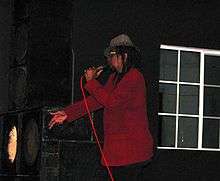Edi Fitzroy
| Edi Fitzroy | |
|---|---|
 | |
| Background information | |
| Birth name | Fitzroy Edwards |
| Born | 1955 (age 60–61) |
| Origin | Chapelton, Clarendon Parish, Jamaica |
| Genres | Reggae |
| Occupation(s) | Singer/songwriter |
| Years active | 1975–present |
| Labels |
Musical Ambassador Alligator VP RAS Confidence |
Fitzroy Edwards (born 1955), better known by his stage name Edi Fitzroy is a Jamaican reggae singer, active since 1975 but best known for his work in the dancehall era.
Biography
Edwards was born in Chapelton, Clarendon Parish, Jamaica and attended Chapelton All-Age and Clarendon College.[1][2] He was exposed to music from an early age via his father Vasco Edwards' sound system.[3][4] After studying at the West Indies Commercial Institute, he took a job as an accounts clerk with the Jamaica Broadcasting Corporation while also singing in his spare time.[1][5] His recordings came to the attention of Mikey Dread, a radio presenter at the station, and with Dread's assistance he released his first single, "Miss Molly Colly", which was a top ten hit in Jamaica in 1978.[5] Further hits followed and Fitzroy toured the United Kingdom with Dread in 1978, supporting The Clash.[5] In the early 1980s, Fitzroy worked with producers such as Lloyd Norris, and Trevor Elliot (who produced the singer's debut album Youthman Penitentiary (1982)).[5] Check For You Once (1982) topped the Jamaican albums chart for four weeks.[3] He performed at Reggae Sunsplash in 1984, returning in 1986, 1988, 1991, and 1993,[6] and also performed at Sunsplash USA in 1988.[7]
Fitzroy's lyrics led to him becoming renowned as one of Jamaica's most socially conscious singers, with themes including equality for women,[5] and he won a Rockers Award in 1984 for Most Conscious Performer for his "Princess Black" single (which he wrote for his mother).[3] He enjoyed a major Jamaican hit with "The Gun", and he contributed to the "Land of Africa" charity single in aid of the Ethiopia famine appear, along with Gregory Isaacs, Freddie McGregor and others, and Fitzroy became a director (along with Rita Marley, Judy Mowatt, Michael "Ibo" Cooper, and Orville Tyson) of the Music Is Life organization, with the aim of making a more lasting contribution toward's Africa's plight.[5]
After the release of his 1993 album Deep in Mi Culture, Fitzroy toured the United States with backing band Massawa.[3] In the mid-1990s he started his own Confidence label to release his own material.[3] He has been a regular performer at annual Peter Tosh memorial concerts in Jamaica.[8][9][10] Only in the mid-1990s did he give up his day-job to pursue music as a full-time career.[1]
Although much of Fitzroy's work has been in an era when slack lyrics and digital rhythms have predominated, in the 1998 book Reggae Island he spelled out his preference for real musicians and 'reality' lyrics:
"I personally like the acoustic sound, which is go in the studio and lay the tracks with your drummer and your bass player and, you know, support, percussionists. I personally as an artist still...just paint it right within the people's minds, you know, to really tell them things, what is really happening, the realistic sense of life, seen?"[11]
Edi Fitzroy is a Rastafarian, stating that he has been "from birth".[1]
Discography
- Youthman Penitentiary (1982), Alligator
- Check For You Once (1982), Musical Ambassador
- Coming Up Strong (1984), Musical Ambassador
- Eclipse (1987), RAS
- Pollution (1990), VP
- Deep in Mi Culture (1993), Henry K
- We a Lion (2000)
- Hold the Vibes (2006), King Step
- Compilations
- First Class Citizen (2001), Musical Ambassador
- The Best Of Edi Fitzroy Featuring Sly and Robbie and The Roots Radics (2010), Musical Ambassador
References
- 1 2 3 4 Anglin-Christie, Kavelle (2007) "Edi Fitzroy still honours 'Princess Black'", Jamaica Gleaner, 15 April 2007, retrieved 2010-08-26
- ↑ Bonitto, Brian (2016) "Fitzroy’s flight with Eagles", Jamaica Observer, 20 January 2016. Retrieved 29 January 2016
- 1 2 3 4 5 Moskowitz, David V. (2006) Caribbean Popular Music, Greenwood Press, ISBN 0-313-33158-8, p. 112
- ↑ Barrow, Steve & Dalton, Peter (2004) The Rough Guide to Reggae, 3rd edn., Rough Guides, ISBN 1-84353-329-4, p. 285
- 1 2 3 4 5 6 Larkin, Colin (1998) The Virgin Encyclopedia of Reggae, Virgin Books, ISBN 0-7535-0242-9, p. 100
- ↑ Thompson, Dave (2002) Reggae & Caribbean Music, Backbeat Books, ISBN 0-87930-655-6, p. 228-233
- ↑ MacNie, Jim (1988) "MUSIC: Sunsplash '88: Not your usual reggae", Providence Journal, 17 June 1988
- ↑ Frater, Adrian (2007) "'Tribute' paid to Lucky Dube", Jamaica Gleaner, 23 October 2007, retrieved 2010-08-26
- ↑ Cooke, Mel (2002) "Bunny Wailer, Bob Andy lead 'Tribute to Peter Tosh'", Jamaica Gleaner, 21 October 2002, retrieved 2010-08-26
- ↑ Frater, Adrian (2008) "Tosh's tribute returns to Belmont", Jamaica Gleaner, 6 October 2008, retrieved 2010-08-26
- ↑ Jahn, Brian & Weber, Tom (1998) Reggae Island: Jamaican Music in the Digital Age, Da Capo Press, ISBN 0-306-80853-6, p. 148-152
External links
|